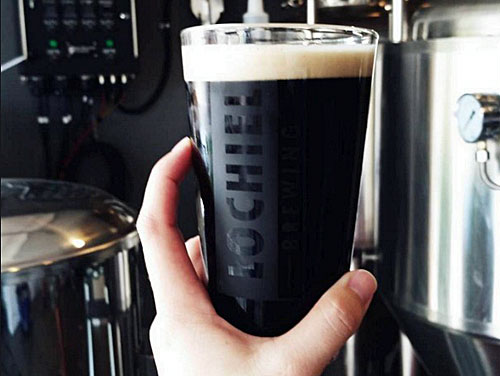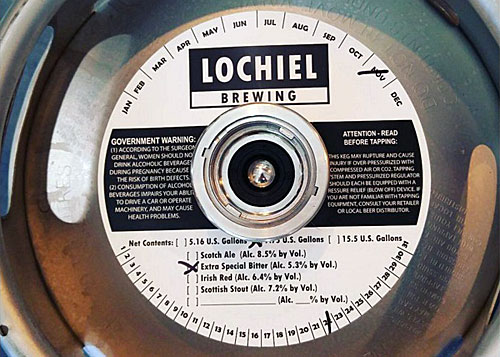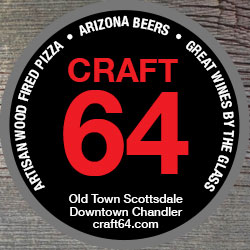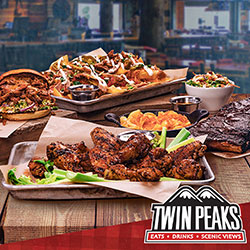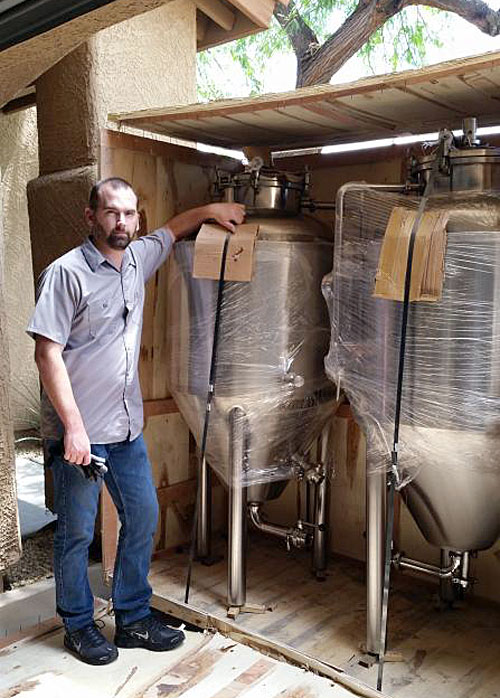
History is brewing on Southern Avenue a half-mile east of Power Road in Mesa. That’s where Ian Cameron is opening Lochiel Brewery – in July, he hopes – which will be notable for several reasons.
Lochiel, named after his family’s ancestral home in Scotland, will be the first brewery in east Mesa, and also the city’s largest, at least in terms of capacity. But perhaps most significantly, Cameron will become Arizona’s – and the country’s – first deaf brewery owner.
I recently interviewed Cameron (via email for obvious reasons) about his plans.
How did you get started making beer?
‘‘I had been home brewing for a long time, for about 15 years now, starting with the basic methods of using carboys, 5-gallon ‘homer-buckets,’ siphon tubes, coil immersion chillers, and so forth. That all changed when I got a huge tax refund one year and used all of it – then some more – to build a brand-new, one-barrel electric brewhouse.’’
Have you ever worked in a brewery?
‘‘I had gotten some experience brewing a few batches of Rosemary IPA and Reynold’s Irish Red with Andrew Bauman at The Perch. My experience was reinforced by building a brewery similar to The Perch’s in my garage to imitate real-life brewery situations using 2-barrel fermenters and brite tanks. I even went to the extent of building a cold room driven by a modified air-conditioner.’’
So if not a brewery, what’s your work background?
‘‘I’m a systems engineer, particularly in cloud engineering. I continue to do this and will for the first parts of the brewery’s operation as I work my way out cleanly and transition my income from one to the other. I live in Mesa and the brewery’s close to where I live. I have lived in the Valley for about 21 years now.’’
What made you decide to open your own brewery?
‘‘Ever since I brewed my first few batches 15 years ago, I knew I wanted to do this for a living post-information technology. I used the years of home-brewing and networking with fellow brewers that have moved up the the pro level to leverage my exit from information technology.’’
Do you have any partners in the brewery?
‘‘At this point, I am the sole owner of Lochiel Brewing, mostly because of failed attempts to get investors.’’
Why did you choose the location in east Mesa?
‘‘Primarily, it’s close to my home. This means I will have more time to be with family and friends that live nearby. Second, I enjoy going to other breweries but it became frustrating that the nearest brewery is at the least 10 miles away. Third, the area is relatively new and the zoning was more friendly for this type of light industrial operation.’’
How big is the space?
‘‘My brewery is about 2,900 square feet. I have a contract with my landlord that I will be taking over the north suite next to me – that adds another 3,500 square feet – around the beginning of second quarter 2017.’’
So Lochiel will open in two phases?
‘‘The brewery is going to be opened for distribution first with a basic tap room. Nothing fancy. The tap room won’t be more built-out until the fourth quarter of 2016 or, at the latest, the first quarter of 2017. But there’ll be an area to comfortably sit around and purchase pints or kegs and get growler fills.’’
What are you planning for beers?
‘‘We’re opening with three Scottish brews. Our flagship is a 200-year-old Clan Cameron of Lochiel family Scottish recipe to take on (Four Peak’s Scottish-style) Kilt Lifter, along with a mighty yet friendly porter and a British-style Extra Special Bitter. We’re also going to be doing other small-batch varieties.’’
What does a ‘‘Clan Cameron of Lochiel family Scottish recipe’’ mean?
‘‘It’s an old recipe that was extremely popular in Scotland, according to family tales, that had been passed down over the generations. I am boldly taking on the Four Peaks Kilt Lifter with Lochiel’s Scottish Ale.’’
So these are old family recipes?
‘‘My late grandparents gave me a few beer recipes – the Scottish, ESB, and porter – that had been with the family for a long time. After brewing some of the family recipes, they’re proving to be consistently popular. It just made sense to make the transition (to a commercial brewery) as demand for my brews grew exponentially.’’
Your core beers won’t include an IPA?
‘‘I’m focusing on more malt-forward beers because of the unbelievable flood of hop-forward beers in the market. Malt-forward beers are much more technical and often difficult to make consistently.’’
Will you have any ‘‘guest’’ beers on tap, or do you plan to sell only your own beers?
‘‘I expect to have between 8-14 taps with 80% pouring Lochiel’s and the rest with other local brews. My core brews – the Scottish, ESB, and porter — will always be tapped. The SBS (small-batch series) will vary from time to time, occupying the remainder of the 80% of my taps.’’
Will there will be a kitchen?
‘‘No kitchen, but prepackaged snacks will be available and we will be hosting food trucks from time to time.’’
What are the specs of your brewing system?
‘‘My brewhouse is a 7-barrel, two-vessel, semi-automatic electric system size with a simultaneous hold capacity of 110 barrels – three 7-barrel fermenters and two 7-barrel brite tanks, and three 15-barrel fermenters and two 15-barrel brite tanks.’’
So the home system in your garage will be collecting dust?
‘‘I have the intention of moving my home brewery to the new location and use it as a pilot brewery and guest brewing system for home-brewers who would like to have a shot at the prime time.’’
Does being deaf have any effect on your brewing?
‘‘Not at all. It’s a good question. Beer-wise, it improves my sense of taste and smell, and that translates to a much better beer quality. Lose a sense, the others improve.’’
How about starting a business like a brewery?
‘‘The business part of it has its challenges from time to time, but mostly all communication. Like where people insist on using the phone between B2B deals. I usually avoid the phone. If somebody really wants my business bad enough, they’ll accommodate.’’

